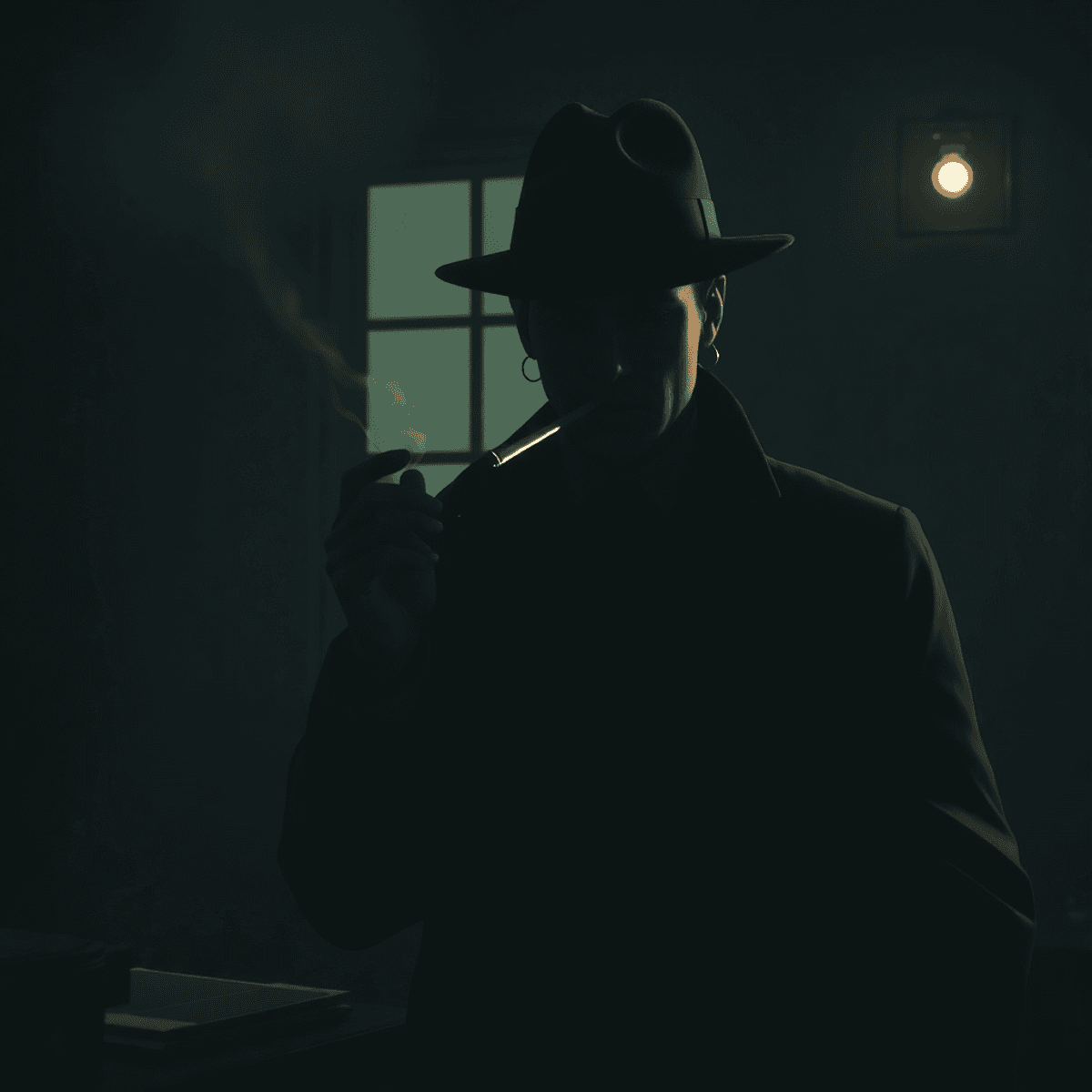Why We Love Our Morally Gray Heroes: The Evolution of the Antihero Detective

Antihero detectives are characters who don't fit the traditional mold of heroes. Instead of always doing what's right, they make decisions based on their own personal beliefs, even if those beliefs aren't always moral. The journey of these characters, from Sam Spade to Max Boucher, shows us why we find such complex figures so compelling.
Morally gray heroes captivate us because they reflect real human contradictions—strengths tangled with weaknesses, noble intentions shadowed by questionable choices. They don’t just solve crimes; they wrestle with their own ethics, making every decision a tightrope walk between right and wrong.
Here's a brief overview of this evolution:
- Sam Spade, the tough private detective from The Maltese Falcon, laid the foundation for antihero detectives in the early 20th century.
- Many years later, characters like Max Boucher introduced new psychological depth and tackled modern social issues.
This ongoing transformation keeps readers hooked on stories where heroism isn’t black or white—but thrillingly ambiguous.
1. Early Origins: Sam Spade and The Maltese Falcon
Sam Spade, created by Dashiell Hammett, is one of the first and most famous examples of the antihero detective. He was introduced in The Maltese Falcon (1929-1930), where he broke away from the traditional, perfect detective stereotype. Spade is neither a hero nor a villain; instead, he is a character navigating a dark world with his own set of rules.
What makes Sam Spade morally gray?
- Pragmatism over idealism: Spade's decisions are based on self-interest and survival rather than pure justice.
- Cynicism: He looks at the world with doubt, questioning people's motives and societal institutions.
- Complex loyalty: While he protects some characters, he doesn't hesitate to betray others if it benefits him.
- Flawed humanity: His choices often blur lines between right and wrong, making him unpredictable yet fascinating.
The Maltese Falcon shaped the antihero detective archetype by adding tension, uncertainty, and toughness into crime fiction. Hammett’s portrayal of Spade introduced readers to a detective who could outsmart opponents without being traditionally heroic. This novel set a new standard—detectives could be tough, clever, and deeply flawed all at once.
Spade’s influence can be seen in literature and film noir, opening doors for future morally complex detectives who would challenge black-and-white ideas of heroism.
2. Hardboiled Fiction: A Cynical Worldview with Morally Ambiguous Protagonists
Hardboiled fiction, a subgenre of detective fiction, is characterized by its gritty realism and tough, cynical protagonists. Here are the key points to understand this compelling genre:
1. Definition and key characteristics of hardboiled detective fiction
Hardboiled fiction features rugged, street-smart detectives who operate in a harsh urban environment filled with violence and corruption. These protagonists often have a cynical worldview and are willing to bend or break the law to achieve their version of justice.
2. Exploration of the cynical legal system portrayed in these stories
In hardboiled fiction, the legal system is often depicted as flawed and ineffective, with justice being elusive or even nonexistent. This portrayal reflects a disillusionment with authority and highlights the moral ambiguity that pervades these narratives.
3. Examination of how morally gray protagonists challenge traditional notions of heroism
Unlike classic heroes who embody unwavering morality and virtue, hardboiled detectives navigate moral gray areas. They operate in shades of gray, making tough decisions that blur the lines between right and wrong. This complex portrayal challenges readers' perceptions of heroism and morality in storytelling.
Hardboiled fiction's allure lies in its gritty realism, morally ambiguous characters, and exploration of societal corruption. The genre continues to captivate audiences with its dark themes and flawed yet compelling protagonists who defy conventional expectations of heroism.
3. Notable Hardboiled Detectives Who Shaped the Genre
Hardboiled fiction introduced a diverse array of iconic detectives who left an indelible mark on the genre:
- Dick Tracy:
- Known for his sharp wit and distinctive yellow trench coat.
- Tracy's relentless pursuit of justice against a backdrop of corruption resonated with readers.
- Philip Marlowe:
- With his cynical worldview and code of honor, Marlowe navigated the seedy underbelly of Los Angeles.
- Raymond Chandler's creation set a high standard for complex, morally ambiguous protagonists.
- Nick Charles:
- A sophisticated detective who balanced charm with sharp investigative skills in "The Thin Man" series.
- Charles challenged traditional masculinity by embracing vulnerability alongside strength.
- Mike Hammer:
- Mickey Spillane's tough-as-nails detective who operated outside the law to deliver swift justice.
- Hammer's unapologetic brutality and skewed moral compass fascinated audiences.
These detectives, among others, carved a path for morally gray heroes in literature by embodying multifaceted personalities and confronting ethical dilemmas that transcended conventional heroism. Their enduring appeal lies in their ability to mirror the complexities of human nature while navigating murky moral landscapes with gritty determination and flawed nobility.
4. The Enduring Appeal of Morally Gray Heroes in Crime Fiction
What makes us root for detectives who aren't textbook heroes? The answer lies deeply embedded in their complex morality. These characters reflect the tangled, often contradictory nature of real human behavior—flawed, conflicted, yet striving to do what’s right in their own way.
Why Readers Love Morally Gray Heroes
Readers are drawn to:
- Authenticity: Morally ambiguous protagonists mirror the imperfect choices we all face.
- Relatability: Their struggles with ethical dilemmas feel genuine, not black-and-white.
- Intrigue: Their unpredictable decisions keep us guessing and engaged.
The Questions Antihero Detectives Face
Antihero detectives don’t just solve crimes; they wrestle with questions like:
“Is justice always just? Can bending rules serve a greater good?”
These intricate moral puzzles create tension beyond whodunit. It’s about whether the detective can reconcile personal beliefs with harsh realities—a dance between integrity and survival.
Challenging Traditional Heroism
This deeper dive into the gray areas challenges traditional heroism by showing that good intentions don’t always lead to clear-cut outcomes. It invites readers to explore a world where right and wrong blur, making every choice heavy with consequence.
5. From Page to Screen: The Evolution Continues with Max Boucher
Comparison between classic antihero detectives like Sam Spade and modern iterations such as Max Boucher
The evolution of antihero detectives from the classic era to contemporary times showcases a shift in the portrayal of morally gray characters. While characters like Sam Spade embodied a more traditional tough and cynical demeanor, modern antiheroes like Max Boucher bring a new level of complexity to the archetype. Max Boucher represents a departure from the stoic, unemotional detective figure of the past, delving deeper into the psyche and emotions of the character.
Discussion on how contemporary authors incorporate psychological depth and social issues into their portrayals of morally gray heroes
Contemporary authors have taken the concept of morally gray heroes to new heights by infusing their narratives with intricate psychological profiles and addressing relevant social issues. Characters like Max Boucher are not just solving crimes; they are battling internal conflicts, confronting their past traumas, and navigating complex ethical dilemmas. This evolution adds layers of realism and depth to these antiheroes, making them more relatable and compelling to modern audiences.
Max Boucher: A Case Study in Flawed Humanity
The Max Boucher series is a clear example of how the antihero detective has evolved—from the classic toughness of Sam Spade to a more complex, modern version. Max Boucher isn't a perfect hero; he's a man filled with contradictions, representing the morally ambiguous heroes we can't help but cheer for.
What makes Max Boucher resonate so deeply?
- Complex Morality: Max doesn’t fit neatly into “good” or “bad.” His decisions often blur ethical lines, reflecting real-world dilemmas where right and wrong aren’t black and white.
- Vulnerability and Strength: While tough and resourceful, Max struggles with personal demons—haunted past choices, fractured relationships, and moments of self-doubt that humanize him beyond the typical detective archetype.
- Reluctant Heroism: He acts not out of pure altruism but necessity, survival, or sometimes guilt. This reluctance adds depth to his character and invites readers to question what drives heroism itself.
- Adaptation to Modern Issues: The series weaves contemporary social themes—corruption, identity crises, systemic injustice—into Max’s narrative, creating a detective who mirrors today’s complex world.
Max Boucher shows why we love our heroes morally gray . His strengths and flaws make him compelling—not just a character solving mysteries but one embodying the messy reality of human nature.
The evolving nature of antiheroes reveals a timeless fascination with characters who defy simple labels of good or evil. From Sam Spade’s gritty pragmatism to Max Boucher’s deeply human struggles, these morally gray heroes invite us to explore complex ethical landscapes where right and wrong blur. Their enduring appeal lies in this very complexity—they reflect our own contradictions and challenges, making their stories resonate.
Ask yourself: What draws you to these flawed detectives? Is it their resilience, their inner battles, or the way they navigate a world that rarely offers clear answers? The evolution of the antihero detective from Sam Spade to Max Boucher — why we love our heroes morally gray — is a journey worth diving into.
Ready to meet Max Boucher and uncover his captivating adventures? Explore the series and experience firsthand what makes this modern detective so compelling. Your next favorite antihero awaits.
FAQs (Frequently Asked Questions)
What defines an antihero detective and why are morally gray heroes significant in literature?
An antihero detective is a protagonist who lacks traditional heroic qualities, often exhibiting moral ambiguity and complex traits. Morally gray heroes are significant in literature because they reflect real human complexities, challenge conventional heroism, and engage readers through their flawed yet relatable nature.
How did Sam Spade from 'The Maltese Falcon' influence the evolution of the antihero detective archetype?
Sam Spade, introduced by Dashiell Hammett in 'The Maltese Falcon,' exemplified the early antihero detective with his morally ambiguous actions and pragmatic approach. His character set foundational traits for the archetype, influencing subsequent portrayals of detectives who operate within ethical gray areas.
What are the key characteristics of hardboiled detective fiction and its portrayal of morally ambiguous protagonists?
Hardboiled detective fiction is characterized by a cynical worldview, gritty settings, and protagonists who navigate corrupt legal systems with moral ambiguity. These stories challenge traditional notions of heroism by presenting detectives who often bend rules and embody complex ethical dilemmas.
Who are some notable hardboiled detectives that shaped the genre and contributed to the popularity of morally ambiguous heroes?
Iconic hardboiled detectives such as Dick Tracy, Philip Marlowe, Nick Charles, and Mike Hammer have shaped the genre with their unique traits. Their complex personalities and flawed ethics have deepened the appeal of morally ambiguous heroes in crime fiction.
Why do readers continue to be drawn to flawed and morally ambiguous antihero detectives in crime fiction?
Readers are attracted to flawed and morally ambiguous antihero detectives because these characters offer intricate moral dilemmas that mirror real-life complexities. Their struggles with right and wrong create engaging narratives that resonate on a psychological level.
How does Max Boucher represent the contemporary evolution of the antihero detective from classic figures like Sam Spade?
Max Boucher embodies the contemporary antihero detective by incorporating psychological depth and addressing social issues within his character development. Unlike classic figures such as Sam Spade, Boucher's complexity highlights flawed humanity, reflecting modern storytelling's focus on nuanced and realistic protagonists.
